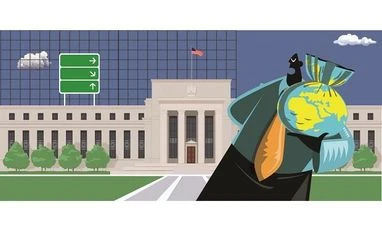Global share prices eased and U.S. Treasury yields hit multi-year highs on Wednesday as investors bet that the U.S. Federal Reserve will couple shrinking of its balance sheet next month with a big interest rate hike to quell decades-high inflation.
Investors also waited for details of the latest package of coordinated sanctions on Russia from the United States and its allies over civilian killings in Ukraine.
The dollar hit its highest in almost two years, while expectations of new sanctions raised oil supply concerns to send crude prices higher.
The STOXX stock index of 600 European companies fell 0.8%, while the MSCI All-Country stock index shed 0.4%.
Fed Governor Lael Brainard said overnight that she expected a combination of interest rate rises and a rapid balance sheet runoff to take U.S. monetary policy to a "more neutral position" later this year.
"What we are getting here is a knee-jerk reaction to the prospect of not only a 50 basis points increase, but we could also start to see the outline of balance sheet reduction a lot earlier than markets have been currently pricing in," said Michael Hewson, chief markets analyst at CMC Markets.
Also Read
The focus of investors on Wednesday will be on the release of minutes from the Fed's last policy meeting, out at 1800 GMT.
"The minutes will be important for two main reasons. First, for clues on the likelihood of a 50 basis point hike and what the committee would need to see to warrant a faster pace of hikes," analysts at UniCredit said in a note to clients.
S&P500 futures edged down 0.3%.
The yield on benchmark 10-year Treasury notes rose to 2.63%, hitting three-year highs after Brainard's remarks.
The U.S. 2-year yield rose to its highest level since January 2019 and the 5-year yield to its highest since December 2018. [US/]
Grace Peters, EMEA head of investment strategy at JPMorgan Private Bank, said 2022 was probably the last year of above-trend economic growth.
"We are seeing Fed policy rapidly moving into restrictive territory. But we don't need to ditch equities, it just means we need to be more risk aware. At this point I would buy the dips but move into higher-quality assets," Peters said.
"Markets see the curve inversion as the clock ticking down to the next recession. But it can be up to two years until recession hits and over that period stocks generally see a double digit upside," she said.
CHINA SERVICES SHRINK
Also drawing attention were China's markets, after data showed activity in its services sector shrank at the fastest in two years in March as a surge of coronavirus infections restricted mobility and weighed on client demand, a closely watched private sector survey showed.
Hong Kong's Hang Seng index lost 1.8% on its return from a holiday, moving away from a one-month high reached on Monday, Chinese blue chips lost 0.3%.
On Tuesday, Chinese authorities extended a COVID-19 lockdown in Shanghai to cover all of the financial centre's 26 million people, despite growing anger over quarantine rules.
Japan's Nikkei shed 1.6%, while the MSCI's broadest index of Asia-Pacific shares outside Japan skidded 1.3%.
The dollar index hit 99.603 after reaching its highest since late May 2020 in early trade, also supported by a fall in the euro, which fell to $1.0894, hurt by fears more sanctions on Russia would damage Europe's economy.
The greenback was also trading firm against the yen at 123.86 yen given the Bank of Japan's conviction and repeated action last week to hold the yield on 10-year Japanese government bonds below 0.25%.
The rise in bond yields globally has put pressure on gold, which pays no return. Spot gold traded down 0.16% at $1,928.8 per ounce. [GOL/]
Oil prices recovered from early losses as the threat of new sanctions on Russia raised supply concerns, but there were fears of weaker demand following an increase in U.S. crude stockpiles and Shanghai's extended lockdown.
U.S. crude was up 0.8% at $102.80 a barrel. Brent crude gained 0.9% to $107.61 per barrel. [O/R]
(Additional reporting by Sujata Rao, Daniel Leussink, Alun John in Hong Kong, Editing by Sam Holmes, Robert Birsel and Alexander Smith)
(Only the headline and picture of this report may have been reworked by the Business Standard staff; the rest of the content is auto-generated from a syndicated feed.)



)